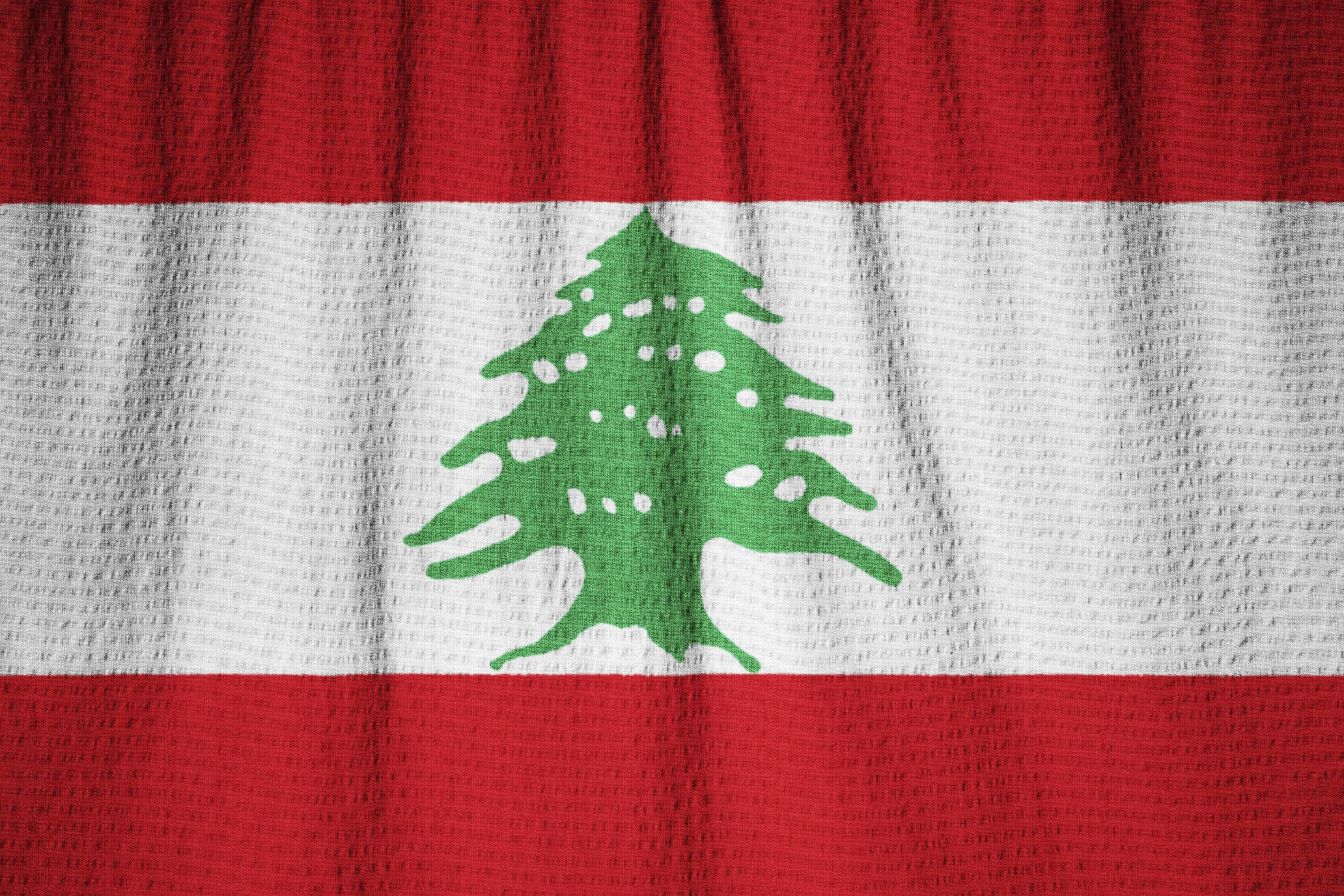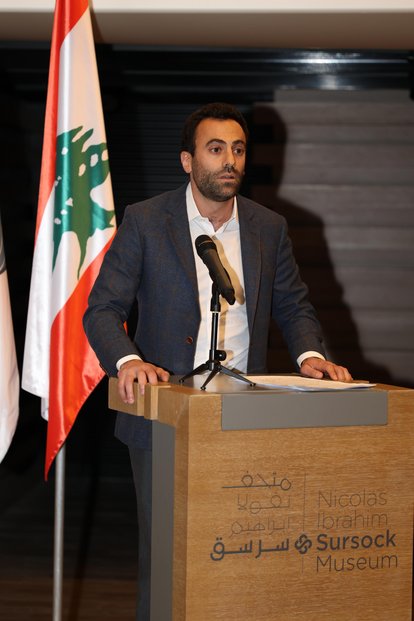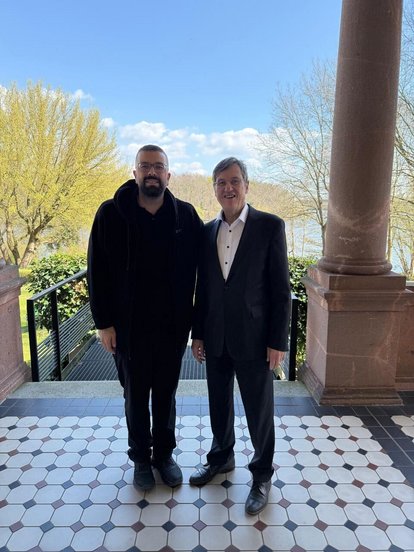Lebanon
The future of Lebanon 50 years after the civil war

Flag of Lebanon
© picture alliance / imageBROKER | Shahid MehmoodThe Lebanese civil war began on April 13, 1975 - a bloody conflict that shook the country once celebrated as the “Switzerland of the Orient” for 15 years and still has repercussions today. Sunday, April 13, 2025, marked the 50th anniversary of the beginning of this dark chapter.
What does the memory of the civil war mean in a Lebanon that is once again suffering from massive political, economic and social crises? And what prospects are there for a better future?
Ahmed Hariri, Secretary General of the “Future Movement”, and Michel Helou, Secretary General of the “Lebanese National Bloc”, share their thoughts in an interview series on this occasion.
Five decades after the outbreak of the Lebanese Civil War: How present is the memory of that time today? And what warning – or even sense of responsibility – do you personally, as a politician, draw from this dark chapter of history?
Ahmad Hariri: "In my view, the memory of the Lebanese Civil War must remain ever-present, serving as a source of historical reflection and learning. As the well-known Lebanese saying goes, “It should be remembered, but never repeated.” It is imperative that we educate future generations to avoid repeating the mistakes of the past and to remain vigilant against any circumstances that might lead to a recurrence of conflict.
I belong to a generation that did not witness the war and its harrowing chapters firsthand. Rather, I lived through the era of the martyred Prime Minister Rafik Hariri, who exerted significant efforts to end the war through dialogue and was the principal architect of the Taif Agreement, which concluded the war in 1989 under the auspices of the Kingdom of Saudi Arabia. He transformed Lebanon—both prior to and during his tenure as Prime Minister—from the devastation of civil conflict to an era marked by peace, stability, reconstruction, and economic revival. He reintegrated Lebanon into the Arab world and the international community, and brought the world back to Lebanon. Moreover, he offered young Lebanese scholarships to some of the world’s most prestigious universities, providing them with opportunities for growth and progress in lieu of resorting to arms and militias.
I also belong to the generation that witnessed the assassination of Prime Minister Rafik Hariri on February 14, 2005—an event widely regarded as the assassination of Lebanon itself and of the collective Lebanese dream for a brighter future. In the wake of this tragedy, Lebanon stood at the brink of renewed civil strife. It was only through the wisdom and foresight of his son, Prime Minister Saad Hariri—leader of our political movement, the Future Movement—that the country was spared. He chose to confront every scheme of division and discord with a unifying national vision, leading the March 14 Alliance that emerged from the Cedar Revolution following the seismic events of February 14.
As Secretary-General of the Future Movement, I have stood alongside Prime Minister Saad Hariri in all his efforts to pursue truth, forgiveness, and reconciliation in relation to the civil war. His unwavering mission has been to build a strong state, empower its institutions, reinforce national unity and coexistence, safeguard Lebanon’s pluralism and freedoms, and uphold the principle of “Lebanon First” above all other allegiances.
These are the conclusions and lessons that all Lebanese must embrace and uphold, regardless of circumstance."
Michel Helou: "The memory of the Lebanese Civil War remains strongly present in our society — not only as historical recollection, but as a lived reality. The root causes of the war — sectarian fragmentation, unequal economic structures, and fragile state institutions — have not been resolved. Instead, they continue to shape Lebanon’s political life.
The country remains divided along communal lines, with each sect maintaining geographic and political strongholds. In moments of tension, these divisions quickly resurface as invisible frontlines — a reminder of how thin the line is between peace and relapse into conflict.
Yet what’s striking in Lebanon is the near-total absence of institutional memory work. Unlike other post-conflict societies such as Rwanda or Bosnia, where national remembrance, reconciliation mechanisms, and historical accountability have been formally pursued, Lebanon has failed to reckon collectively with its past. There is no national archive of the war, no truth commission, and no shared narrative — only silence, denial, or sectarian versions of history. This vacuum perpetuates impunity and hinders the building of a common future.
In my political and civic engagement, this memory — both personal and unacknowledged — reinforces a deep sense of responsibility: to challenge sectarianism, resist the normalization of political violence, and build a state that treats all citizens equally. The war ended in 1990, but we cannot say it is truly over until we dismantle the conditions that made it possible in the first place — and until we commit to the hard but necessary work of remembering together."

Michel Helou speaking at the Lebanese National Bloc event commemorating the 50th memorial of the Lebanese civil war.
© National Bloc LBFrom the final phase of the war comes a widely quoted statement by Pope John Paul II: “Lebanon is more than a country – it is a message of freedom and an example of pluralism for the East as well as for the West.” How much of this hopeful message is still tangible today – and how can it be revived in the country’s political and social life?
Ahmad Hariri: "It is important to note that the late Pope John Paul II’s renowned statement describing Lebanon as a “message” was made during his historic visit to the country in 1997. At this point, we also recall the martyred President Rafik Hariri, who most fittingly embodied this Lebanese message. He played a pivotal role in extending the invitation to the Pope and in organizing the visit in coordination with the Vatican. This historic occasion reflected the true image of post-war Lebanon and marked a new chapter of unity and coexistence among Lebanese citizens, both Muslims and Christians.
The words of the late Pope indeed convey the profound truth about Lebanon. We remain deeply committed to preserving Lebanon’s message of diversity, pluralism, and coexistence—and to strengthening it across all aspects of our national life. This commitment is essential to maintaining peace and stability in a country whose people are deserving of hope and a better future—just as Rafik Hariri endeavored to provide."
Michel Helou: "In 1997, Pope John Paul II delivered a powerful message about Lebanon’s potential as a beacon of pluralism in the Middle East. His words still resonate deeply with many Lebanese, but its promise has been increasingly challenged by years of political dysfunction, economic collapse, and the entrenchment of sectarian power structures. While Lebanon remains a diverse society, pluralism has too often been reduced to a mere coexistence of communities, rather than genuine political and social inclusion.
To revive this message, we must first move beyond a system that defines citizens by their sect. True pluralism means equality before the law, a merit-based political culture, and a shared national identity that transcends communal affiliations. It also means protecting freedoms — of expression, belief, and association — while fostering a civic sense of belonging. Lebanon still holds the potential to be a model for the region, but only if pluralism is lived as a democratic value, not just a demographic fact."

Ahmad Hariri and Karl-Heinz Paqué on April 9th 2025
© FNFAfter years of profound crises – the economic collapse, the Beirut port explosion, the consequences of the war in Syria, and the destructive conflict between Hezbollah and Israel – Lebanon once again stands at a crossroads. What hopes and concerns do you have for the future of your country? What is needed for Lebanon to unlock its full potential – and what role can international political cooperation play in this process?
Ahmad Hariri: "Today marks a moment filled with hope, as Lebanon enters a new era following the election of General Joseph Aoun as President of the Republic. His historic inaugural address resonated with the aspirations of all Lebanese who uphold the principle of “Lebanon First” and seek the establishment of a strong and just state. His speech reaffirmed a commitment to the implementation of the Taif Constitution, the exclusive authority of the state over all arms, the restoration of robust relations with Arab nations, adherence to Arab and international legitimacy, and the full execution of international resolutions—most notably Resolution 1701. These measures are intended to place Lebanon on a trajectory toward reform, economic recovery, and national reconstruction.
The Future Movement expresses its full support for President Joseph Aoun and views this moment as a golden opportunity for Lebanon—one that must not be squandered. It is a chance to address the country’s multifaceted crises and to pursue comprehensive national solutions, particularly in light of recent positive developments in the region that favor Lebanon. Foremost among these are the fall of the criminal Assad regime and the diminishing influence of Iran and its armed proxies in Lebanon and several other Arab states. These regional shifts are accompanied by a welcome and renewed Arab engagement with Lebanon, spearheaded by the Kingdom of Saudi Arabia, with the aim of assisting the nation in its recovery and resurgence. We also extend our deep appreciation to Lebanon’s international allies, whose continued efforts are vital in ensuring that the country does not regress.
This is a pivotal juncture in our national history—and with a unified national will, reinforced by Arab support and international cooperation, Lebanon can finally achieve its full potential."
Michel Helou: "Lebanon’s future depends on the ability to build a renewed political and social contract. This new contract must be grounded in accountability, equality, and the strengthening of public institutions.
Lebanon must adopt and fully implement all relevant international resolutions, including UN Security Council Resolutions 1701, 1559, and 1680, as well as the cessation of hostilities agreement with Israel set for November 2024. The Israeli occupation of Lebanese land must cease immediately, with Israel’s full withdrawal and the Lebanese Armed Forces (LAF) being the sole possessors and users of legal violence within the country. Another critical need is the comprehensive rebuilding of what was destroyed during the recent war, restoring infrastructure, homes, and livelihoods to affected people.
Key reforms include the establishment of an independent judiciary, rebuilding trust in public institutions, and restructuring the banking sector to restore a functioning economy. The depositors’ funds crisis must be addressed urgently, along with the restoration of confidence in Lebanon’s financial system.
International political cooperation plays a crucial role, but not in imposing solutions. Rather, it must support Lebanese reformers, reject cooperation with corrupt actors, and prioritize the sovereignty of the Lebanese people. Lebanon’s future depends on reclaiming its sovereignty, rebuilding its institutions, and implementing these necessary reforms."
For more information, we recommend the following analysis by Ralf Erbel with recommendations for action (in German).
